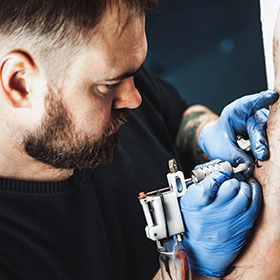Can doctors have tattoos? Yes, they can.
Society’s views on tattoos are changing. More professionals, including doctors, embrace body art. Tattoos are no longer taboo in many workplaces. Times have changed, and so have attitudes toward tattoos. Doctors, like anyone else, have personal lives and choices. The question often arises due to the perception of professionalism in healthcare.
Patients might wonder if tattoos affect a doctor’s competence or care. But does a tattoo really impact a doctor’s abilities? This blog will explore the intersection of tattoos and the medical profession, examining how perceptions have evolved and what it means for doctors today. Let’s dive into the discussion and uncover the reality behind doctors with tattoos.
Introduction To Tattoos In Medicine
Tattoos have a long history. In ancient times, tattoos were often linked to rituals or status. Some cultures used tattoos as protection or for healing. In the past, doctors did not have tattoos. Tattoos were seen as unprofessional or rebellious. Medical professionals were expected to look clean and traditional. Over time, views have changed.
Today, tattoos are more common. Many doctors now have tattoos. Society’s view on tattoos has become more accepting. Younger generations of doctors feel more free to express themselves. Tattoos can be hidden under clothes during work. Sometimes, patients do not even notice. Many hospitals have relaxed their rules on tattoos. Tattoos are becoming a normal part of life.
Perception Of Tattoos In Healthcare
Some patients might worry about doctors with tattoos. They may think tattoos look unprofessional. Others might not care about tattoos at all. For some, tattoos can help doctors seem more friendly and open. These patients may feel more at ease. Every patient is different. Their views can be very personal.
Colleagues in healthcare may have mixed feelings about tattoos. Some might think tattoos are cool and modern. They may feel it does not affect work. Others may see tattoos as distracting or unprofessional. Opinions can vary a lot. It often depends on the workplace culture. Some places are more open to tattoos than others.
Professionalism And Appearance
Many hospitals have dress codes. These rules help maintain a professional look. Doctors often wear white coats. Tattoos must be covered if they seem inappropriate. Some tattoos are allowed if they are small and not offensive.
Patients might judge doctors with tattoos. Some might think tattoos look unprofessional. This can affect a doctor’s credibility. Others might feel more connected to doctors with tattoos. They see them as more human and approachable.
Cultural And Regional Differences
Western countries are more open to tattoos. Many doctors have tattoos without hiding them. Patients often do not mind. They see it as personal choice. Some hospitals have rules about visible tattoos. Often, it depends on the place and the people.
Eastern views on tattoos are different. Some cultures see tattoos as bad. In places like Japan, tattoos are linked to gangs. Doctors with tattoos may face judgment. They might need to cover them. In China, tattoos are less common for professionals. It can affect how doctors are seen by patients.
Legal And Ethical Considerations
Many hospitals have rules about tattoos. Some places do not allow visible tattoos. Others may ask you to cover them. These rules can vary a lot. It is important to know your workplace policy.
Some people may judge doctors with tattoos. This can lead to unfair treatment. Patients may feel uneasy. Even colleagues might act differently. These are discrimination issues. They can affect your job and relationships.
Benefits Of Tattoos For Doctors
Doctors with tattoos can build trust with patients. Tattoos show that doctors are real people. This helps patients feel comfortable. Some patients may have tattoos too. They might think the doctor understands them better. This can make talking easier. Patients may open up more. This makes the doctor’s job easier.
Tattoos let doctors show their personality. They can express their beliefs or interests. This can make doctors feel happy and unique. Being happy at work is important. It can make doctors better at their job. Tattoos can also start conversations. This can make the workday more fun.
Challenges Faced By Tattooed Doctors
Many people hold negative views about tattoos. These views can affect doctors. Some patients might not trust a doctor with tattoos. They may think tattoos mean the doctor is less professional. Trust is important in a doctor-patient relationship. Losing trust can hurt the doctor’s ability to help.
Tattoos can impact career growth. Some hospitals have strict policies about tattoos. They might not hire or promote doctors with visible tattoos. This means a tattooed doctor might miss out on better job opportunities. Even if the doctor is very skilled, tattoos might hold them back.
Changing The Narrative
Doctors with tattoos can be strong role models. They show that appearance doesn’t affect skill. Tattoos can make doctors more relatable to patients. Many patients feel closer to doctors with tattoos. These doctors can also advocate for self-expression. They prove that being professional and having tattoos can go hand in hand.
In the future, more doctors might have tattoos. Society is accepting tattoos more. This change can lead to greater diversity in the medical field. Hospitals might update their policies on tattoos. Patients might also have new views. They might judge doctors by their skills, not their tattoos.
Conclusion
Tattoos on doctors are becoming more accepted today. Patients value skill over appearance. Each hospital or clinic has its own policies. Understanding these guidelines is important for doctors. Respect for patient comfort is also essential. Tattoos can express individuality without affecting care quality.
Professionalism and empathy remain key. Thus, doctors with tattoos can still provide excellent care.

